2023-2024学年英语仁爱版八年级上册 课件 Unit 2 Topic 2 I must ask him to give up smoking. Section D (共35张PPT)
文档属性
| 名称 | 2023-2024学年英语仁爱版八年级上册 课件 Unit 2 Topic 2 I must ask him to give up smoking. Section D (共35张PPT) |

|
|
| 格式 | pptx | ||
| 文件大小 | 4.7MB | ||
| 资源类型 | 教案 | ||
| 版本资源 | 仁爱科普版 | ||
| 科目 | 英语 | ||
| 更新时间 | 2024-03-20 11:10:17 | ||
图片预览

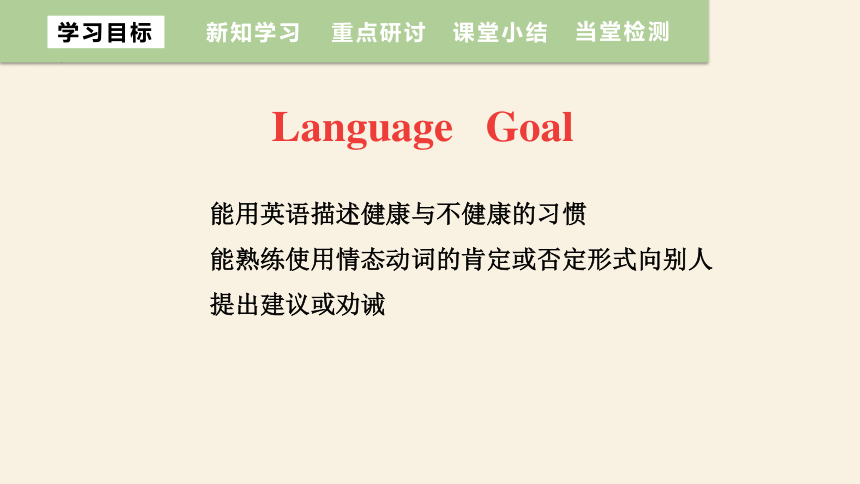
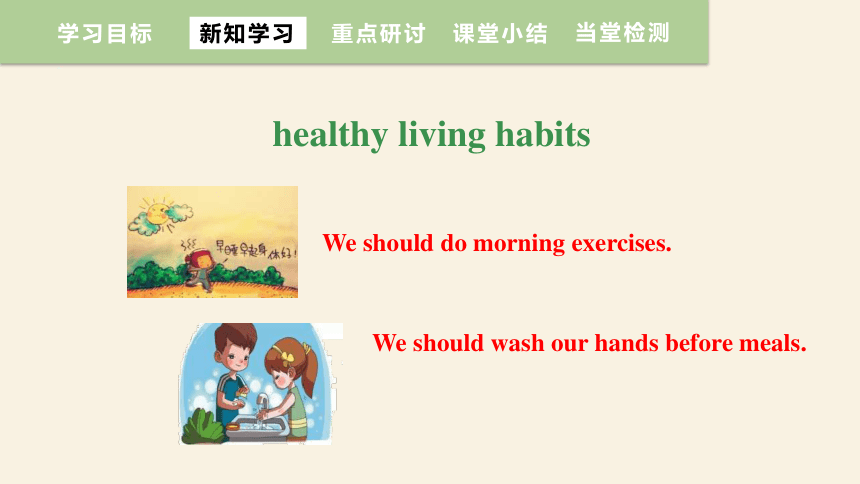
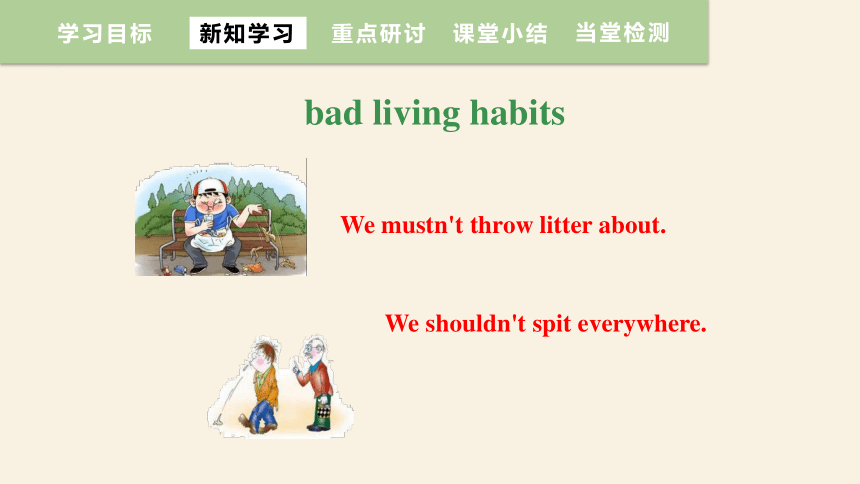
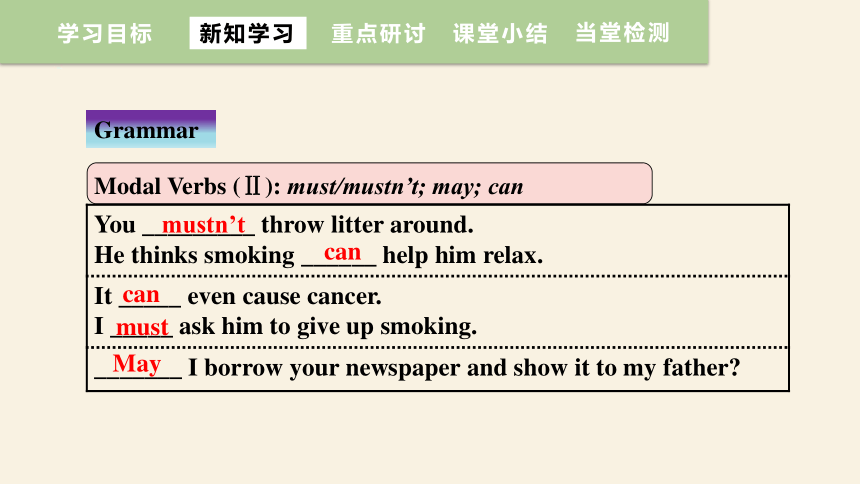
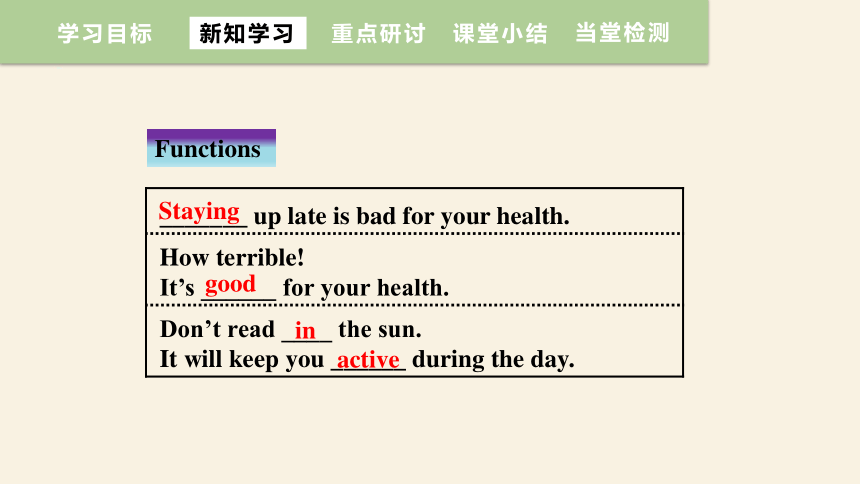
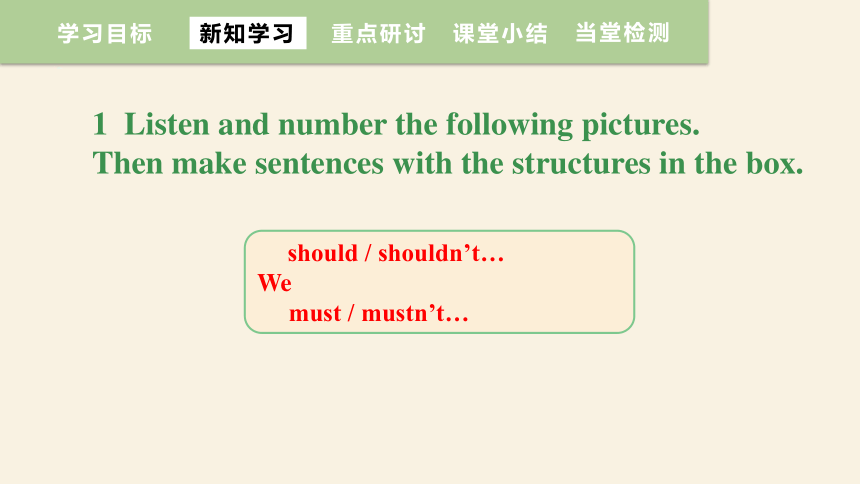
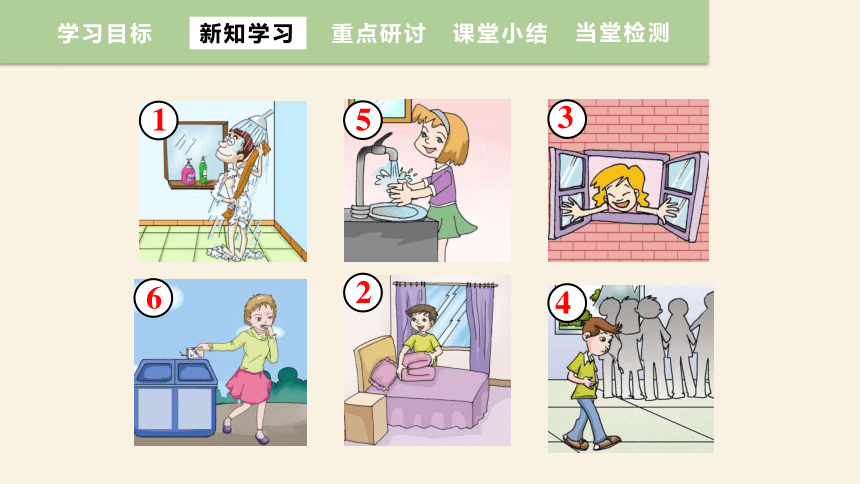
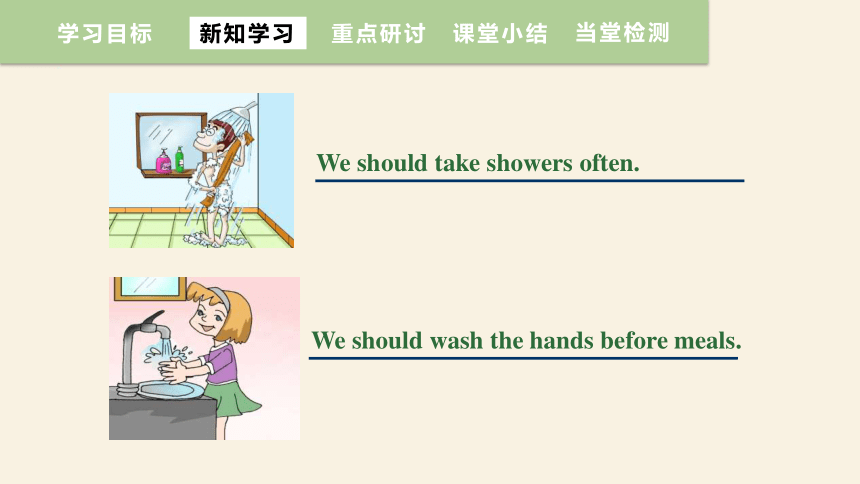
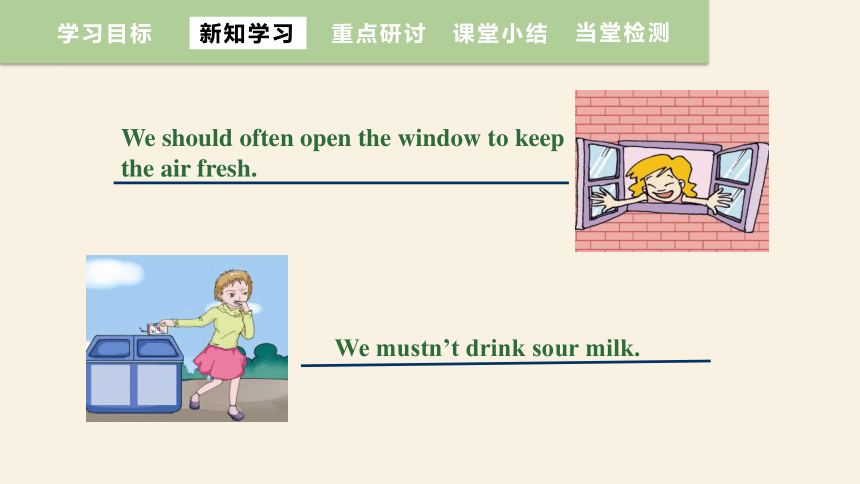
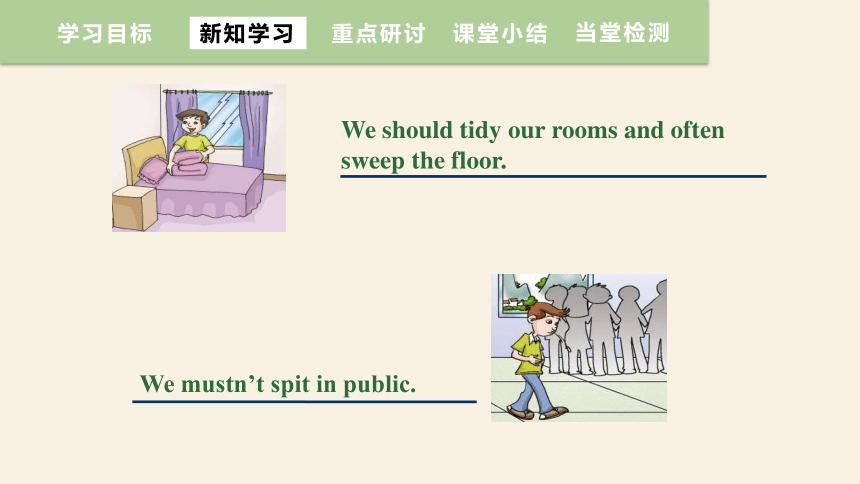
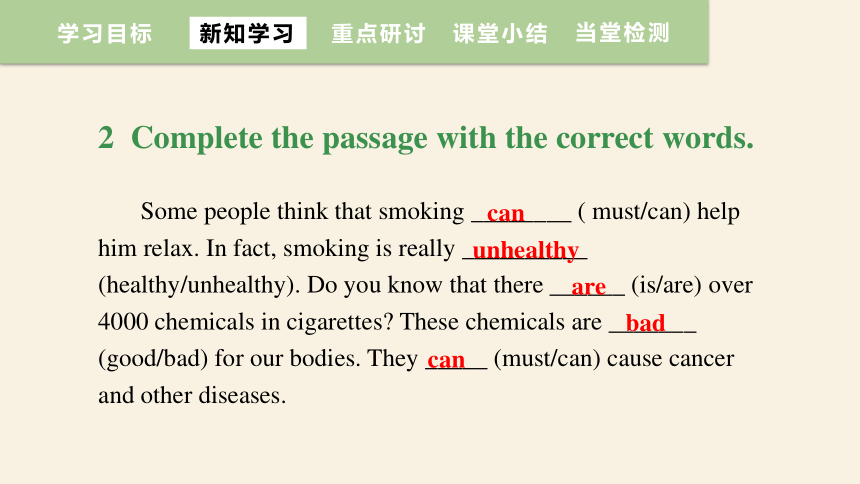
文档简介
(共35张PPT)
Unit 2
Keeping Healthy
Topic 2
Section D
新知学习
重点研讨
课堂小结
当堂检测
学习目标
Language Goal
能用英语描述健康与不健康的习惯
能熟练使用情态动词的肯定或否定形式向别人提出建议或劝诫
新知学习
重点研讨
课堂小结
当堂检测
学习目标
We should do morning exercises.
We should wash our hands before meals.
healthy living habits
新知学习
重点研讨
课堂小结
当堂检测
学习目标
We shouldn't spit everywhere.
We mustn't throw litter about.
bad living habits
新知学习
重点研讨
课堂小结
当堂检测
学习目标
Modal Verbs (Ⅱ): must/mustn’t; may; can
You _________ throw litter around.
He thinks smoking ______ help him relax.
It _____ even cause cancer.
I _____ ask him to give up smoking.
_______ I borrow your newspaper and show it to my father
can
May
mustn’t
must
can
Grammar
新知学习
重点研讨
课堂小结
当堂检测
学习目标
_______ up late is bad for your health.
How terrible!
It’s ______ for your health.
Don’t read ____ the sun.
It will keep you ______ during the day.
in
Staying
good
Functions
active
新知学习
重点研讨
课堂小结
当堂检测
学习目标
1 Listen and number the following pictures.
Then make sentences with the structures in the box.
should / shouldn’t…
We
must / mustn’t…
新知学习
重点研讨
课堂小结
当堂检测
学习目标
1
2
3
4
5
6
新知学习
重点研讨
课堂小结
当堂检测
学习目标
We should take showers often.
We should wash the hands before meals.
We should often open the window to keep the air fresh.
We mustn’t drink sour milk.
新知学习
重点研讨
课堂小结
当堂检测
学习目标
新知学习
重点研讨
课堂小结
当堂检测
学习目标
We should tidy our rooms and often sweep the floor.
We mustn’t spit in public.
新知学习
重点研讨
课堂小结
当堂检测
学习目标
2 Complete the passage with the correct words.
Some people think that smoking ________ ( must/can) help him relax. In fact, smoking is really __________ (healthy/unhealthy). Do you know that there ______ (is/are) over 4000 chemicals in cigarettes These chemicals are _______ (good/bad) for our bodies. They _____ (must/can) cause cancer and other diseases.
can
unhealthy
are
bad
can
The smoke from cigarettes harms ____________ (only/ not only) smokers but also other people. It’s called “second-hand smoke” and it ______ (can/can’t) be more dangerous and has higher risks. Smokers shouldn’t use smoking to help them relax. They ______ (must/mustn’t) give up smoking as soon as possible.
not only
can
must
新知学习
重点研讨
课堂小结
当堂检测
学习目标
Work in groups, write down the good habits and bad habits around you.
Good habit Bad habit
Drink a glass of milk every day. Spit everywhere.
… …
Group Work
新知学习
重点研讨
课堂小结
当堂检测
学习目标
4. Washing hands before meals.
1. Taking a walk after meals.
2. Going to bed early and getting up early.
3. Drinking enough water every day.
新知学习
重点研讨
课堂小结
当堂检测
学习目标
Good habits
4. Going to school without breakfast.
1. Eating too much meat.
2. Going to bed late and getting up late.
3. Throwing litter around.
新知学习
重点研讨
课堂小结
当堂检测
学习目标
Bad habits
Can you give more suggestions on keeping healthy
1. We must have enough food to keep healthy.
2. We must have the right kinds of food.
3. We should have different food.
4. We shouldn’t eat too little or too much.
新知学习
重点研讨
课堂小结
当堂检测
学习目标
Project
1. Choose the answer to each question according to your lifestyle.
( )1.How often do you walk to school
A. Never. B. Sometimes. C. Always.
( )2.How often do you eat candy
A. Often. B. Seldom. C. Never.
( )3.How long do you usually sleep at night
A. Less than 7 hours. B. More than 10 hours.
C. 7-10 hours.
Testing How Healthy You Are
新知学习
重点研讨
课堂小结
当堂检测
学习目标
( )4.How often do you exercise
A. Less than three times a week.
B. Three to six times a week.
C. Every day.
( )5.How often do you eat fruit and vegetables
A. Never. B. Seldom. C. Often.
( )6.How long do you watch TV every day
A. More than 4 hours. B. 2-4 hours.
C. Less than 2 hours.
新知学习
重点研讨
课堂小结
当堂检测
学习目标
Scores: A = 1 point B = 2 points C = 3 points
Total score: _________
Conclusion What you should do to keep healthy.
(6-9) Unhealthy
(10-13) Just so-so
(14-18) Healthy
新知学习
重点研讨
课堂小结
当堂检测
学习目标
新知学习
重点研讨
课堂小结
当堂检测
学习目标
2. Write a passage about how to keep healthy.You may use the questions above as a guide.
Language points
新知学习
重点研讨
课堂小结
当堂检测
学习目标
1. We should often open the window to keep the air fresh. 我们应该经常开窗保持空气清新。
keep 后接形容词。意为“保持(某种状态)”,keep作系动词,也可以用be替换。如:
keep quite!=be quite! 请保持安静!
【扩展】keep sb./sth. +形容词/动名词表示“让某人/ 某物处于某种状态”。 如:
Keep the windows open, please. 请把窗户打开。
Don’t keep him waiting. 不要让他一直等着。
新知学习
重点研讨
课堂小结
当堂检测
学习目标
2. Smokers shouldn’t use smoking to help them relax. 吸烟者不应该用吸烟来放松自己。
use sth to do sth. 意为“用....去做....”如:
We often use the dictionary to look up the new words. 我们经常使用词典去查阅新单词。
新知学习
重点研讨
课堂小结
当堂检测
学习目标
3.In fact, smoking is really unhealthy
事实上,抽烟真的是不健康的。
In fact 事实上
eg. In fact, I like playing computer games.
事实上,我喜欢玩电脑游戏。
In fact, I want to eat an ice cream.
事实上,我想吃一个冰激凌。
新知学习
重点研讨
课堂小结
当堂检测
学习目标
4.They must give up smoking as soon as possible .
他们必须尽可能快的戒烟。
give up sth/ doing sth 放弃做某事
as soon as possible 尽可能快的 as much as possible 尽可能多的 as small as possible 尽可能小的
As+形容词+as possible 可以与as...as one can 互换使用。
新知学习
重点研讨
课堂小结
当堂检测
学习目标
如:
Please write down your answer as fast as possible.
=Please write down your answer as fast as you can.
请尽可能快的写下你的答案。
后也可以放中间,但代词只能放中间,
如:throw it around )
litter作动词,意思与throw about相当。
eg.Don't litter the ground with paper.
litter作不可数名词时,指“垃圾,废物”。
eg.You mustn't throw about litter.
新知学习
重点研讨
课堂小结
当堂检测
学习目标
5.The smoke from cigarettes harms not only smokers but also other people.
来自香烟的烟雾不仅伤害吸烟者,而且对其他人也有危害。
Not only…but also… 不仅…而且… 用于连接两个并列成分。
新知学习
重点研讨
课堂小结
当堂检测
学习目标
1. can 的用法:
(1) 表示能力时一般译为“能、会”, 即有种能力,尤其是生来具备的能力,此时
may 和must 均不可代替它。
如:She can swim fast, but I can’t . 她能游得很快,但我不能。
I can see with my eyes. 我用眼睛看。
(2) 表示许可,常在口语中。如:You can use my dictionary. 你可以用我的字典。
(3) 表示推测,意为“可能”, 常用于否定句和疑问句中, 此时can’t 译为“ 不可能”。
如:Can the news be true 这个消息会是真的吗?
2. could的用法:
(1) can的过去式,意为“ 能、 会”,表示过去的能力。
如:He could write poems when he was 10.
他十岁时就会写诗。
(2) could在疑问句中,表示委婉的语气,此时 could 没有过去式的意思。
如: --- Could I use your pen 我能用一下你的钢笔吗
--- Yes, you can.可以。(注意回答)
新知学习
重点研讨
课堂小结
当堂检测
学习目标
3. may的用法:
(1) 表示请求、许可,比can 正式。
如:May I borrow your bike
我可以借你的自行车吗?
You may go home now.
现在你可以回家了。
(2) 表示推测,谈论可能性,意为“ 可能, 或许”,一般用于肯定句中。
如:It may rain tomorrow . 明天可能会下雨。
She may be at home. 她可能在家呢.
新知学习
重点研讨
课堂小结
当堂检测
学习目标
4. must的用法:
(1) must 表示主观看法,意为“必须、一定”。
如:You must stay here until I come back.
在我回来之前你必须待在这儿。
Must I hand in my homework right now
我必须现在交作业吗?
(2) 其否定形式mustn’t表示“一定不要”“千万别”“禁止,不许”。
如:You mustn’t play with fire.
你不许玩火。
You mustn’t be late.
你一定不要迟到。
新知学习
重点研讨
课堂小结
当堂检测
学习目标
(3) 对must引导的疑问句,肯定回答为must,否定回答为needn’t 或 don’t have to.
如:--- Must I finish my homework now
我现在必须完成作业吗?
--- No, you needn’t.不,你不必。
(4) must表示有把握的推测,用于肯定句。
如: The light is on, so he must be at home now.
灯亮着,他现在肯定在家。
新知学习
重点研讨
课堂小结
当堂检测
学习目标
新知学习
重点研讨
课堂小结
当堂检测
学习目标
重点单词和短语: shower, fact, unhealthy, chemical, cigarette , body, disease, smoker, harm, second-hand, risk, possible, as...as possible
吸烟的危害:
1. These chemicals are bad for our bodies. They can cause _______and other diseases.
2. The smoke from cigarettes harms not only smokers but other people. It’s called “____________” and can be more dangerous and has higher risks.
1.向别人建议最好做某事:___________+ 动词原形+...。
2.建议别人最好不做某事:
______________+动词原形+...
You’d better
You’d better not
cancer
second-smoke
Unit 2 Topic2
Section D
新知学习
重点研讨
课堂小结
当堂检测
学习目标
一、 从方框中选词或词组并用其适当的形式填空
body, disease, in fact,
as soon as possible, risk
1. He isn’t a Chinese. _____ , he comes from Japan.
2. If there is something wrong with our , it shows we are ill.
3. Headache is not a , but if it lasts too long, you should care for it.
4. You should think about its before you decide to do the thing.
5. It’s too late. I must finish the work _________ .
In fact
body
disease
risk
as soon as possible
二、 用must, mustn’t, needn’t, may, have to 填空
1. — ________ I take the message for you right now
— No, you needn’t.
2. Do we ________ join the club today
3. Look at the sign. You ________ throw litter around here.
4. — ________ I ask you some questions, Dr. Li
— Sure, go ahead.
5. Must we exercise to prevent the flu
Yes, we ________. / No, we don’t ________. / No, we ____________.
Must
have to
mustn't
May
needn't
don't have to
must
新知学习
重点研讨
课堂小结
当堂检测
学习目标
Unit 2
Keeping Healthy
Topic 2
Section D
新知学习
重点研讨
课堂小结
当堂检测
学习目标
Language Goal
能用英语描述健康与不健康的习惯
能熟练使用情态动词的肯定或否定形式向别人提出建议或劝诫
新知学习
重点研讨
课堂小结
当堂检测
学习目标
We should do morning exercises.
We should wash our hands before meals.
healthy living habits
新知学习
重点研讨
课堂小结
当堂检测
学习目标
We shouldn't spit everywhere.
We mustn't throw litter about.
bad living habits
新知学习
重点研讨
课堂小结
当堂检测
学习目标
Modal Verbs (Ⅱ): must/mustn’t; may; can
You _________ throw litter around.
He thinks smoking ______ help him relax.
It _____ even cause cancer.
I _____ ask him to give up smoking.
_______ I borrow your newspaper and show it to my father
can
May
mustn’t
must
can
Grammar
新知学习
重点研讨
课堂小结
当堂检测
学习目标
_______ up late is bad for your health.
How terrible!
It’s ______ for your health.
Don’t read ____ the sun.
It will keep you ______ during the day.
in
Staying
good
Functions
active
新知学习
重点研讨
课堂小结
当堂检测
学习目标
1 Listen and number the following pictures.
Then make sentences with the structures in the box.
should / shouldn’t…
We
must / mustn’t…
新知学习
重点研讨
课堂小结
当堂检测
学习目标
1
2
3
4
5
6
新知学习
重点研讨
课堂小结
当堂检测
学习目标
We should take showers often.
We should wash the hands before meals.
We should often open the window to keep the air fresh.
We mustn’t drink sour milk.
新知学习
重点研讨
课堂小结
当堂检测
学习目标
新知学习
重点研讨
课堂小结
当堂检测
学习目标
We should tidy our rooms and often sweep the floor.
We mustn’t spit in public.
新知学习
重点研讨
课堂小结
当堂检测
学习目标
2 Complete the passage with the correct words.
Some people think that smoking ________ ( must/can) help him relax. In fact, smoking is really __________ (healthy/unhealthy). Do you know that there ______ (is/are) over 4000 chemicals in cigarettes These chemicals are _______ (good/bad) for our bodies. They _____ (must/can) cause cancer and other diseases.
can
unhealthy
are
bad
can
The smoke from cigarettes harms ____________ (only/ not only) smokers but also other people. It’s called “second-hand smoke” and it ______ (can/can’t) be more dangerous and has higher risks. Smokers shouldn’t use smoking to help them relax. They ______ (must/mustn’t) give up smoking as soon as possible.
not only
can
must
新知学习
重点研讨
课堂小结
当堂检测
学习目标
Work in groups, write down the good habits and bad habits around you.
Good habit Bad habit
Drink a glass of milk every day. Spit everywhere.
… …
Group Work
新知学习
重点研讨
课堂小结
当堂检测
学习目标
4. Washing hands before meals.
1. Taking a walk after meals.
2. Going to bed early and getting up early.
3. Drinking enough water every day.
新知学习
重点研讨
课堂小结
当堂检测
学习目标
Good habits
4. Going to school without breakfast.
1. Eating too much meat.
2. Going to bed late and getting up late.
3. Throwing litter around.
新知学习
重点研讨
课堂小结
当堂检测
学习目标
Bad habits
Can you give more suggestions on keeping healthy
1. We must have enough food to keep healthy.
2. We must have the right kinds of food.
3. We should have different food.
4. We shouldn’t eat too little or too much.
新知学习
重点研讨
课堂小结
当堂检测
学习目标
Project
1. Choose the answer to each question according to your lifestyle.
( )1.How often do you walk to school
A. Never. B. Sometimes. C. Always.
( )2.How often do you eat candy
A. Often. B. Seldom. C. Never.
( )3.How long do you usually sleep at night
A. Less than 7 hours. B. More than 10 hours.
C. 7-10 hours.
Testing How Healthy You Are
新知学习
重点研讨
课堂小结
当堂检测
学习目标
( )4.How often do you exercise
A. Less than three times a week.
B. Three to six times a week.
C. Every day.
( )5.How often do you eat fruit and vegetables
A. Never. B. Seldom. C. Often.
( )6.How long do you watch TV every day
A. More than 4 hours. B. 2-4 hours.
C. Less than 2 hours.
新知学习
重点研讨
课堂小结
当堂检测
学习目标
Scores: A = 1 point B = 2 points C = 3 points
Total score: _________
Conclusion What you should do to keep healthy.
(6-9) Unhealthy
(10-13) Just so-so
(14-18) Healthy
新知学习
重点研讨
课堂小结
当堂检测
学习目标
新知学习
重点研讨
课堂小结
当堂检测
学习目标
2. Write a passage about how to keep healthy.You may use the questions above as a guide.
Language points
新知学习
重点研讨
课堂小结
当堂检测
学习目标
1. We should often open the window to keep the air fresh. 我们应该经常开窗保持空气清新。
keep 后接形容词。意为“保持(某种状态)”,keep作系动词,也可以用be替换。如:
keep quite!=be quite! 请保持安静!
【扩展】keep sb./sth. +形容词/动名词表示“让某人/ 某物处于某种状态”。 如:
Keep the windows open, please. 请把窗户打开。
Don’t keep him waiting. 不要让他一直等着。
新知学习
重点研讨
课堂小结
当堂检测
学习目标
2. Smokers shouldn’t use smoking to help them relax. 吸烟者不应该用吸烟来放松自己。
use sth to do sth. 意为“用....去做....”如:
We often use the dictionary to look up the new words. 我们经常使用词典去查阅新单词。
新知学习
重点研讨
课堂小结
当堂检测
学习目标
3.In fact, smoking is really unhealthy
事实上,抽烟真的是不健康的。
In fact 事实上
eg. In fact, I like playing computer games.
事实上,我喜欢玩电脑游戏。
In fact, I want to eat an ice cream.
事实上,我想吃一个冰激凌。
新知学习
重点研讨
课堂小结
当堂检测
学习目标
4.They must give up smoking as soon as possible .
他们必须尽可能快的戒烟。
give up sth/ doing sth 放弃做某事
as soon as possible 尽可能快的 as much as possible 尽可能多的 as small as possible 尽可能小的
As+形容词+as possible 可以与as...as one can 互换使用。
新知学习
重点研讨
课堂小结
当堂检测
学习目标
如:
Please write down your answer as fast as possible.
=Please write down your answer as fast as you can.
请尽可能快的写下你的答案。
后也可以放中间,但代词只能放中间,
如:throw it around )
litter作动词,意思与throw about相当。
eg.Don't litter the ground with paper.
litter作不可数名词时,指“垃圾,废物”。
eg.You mustn't throw about litter.
新知学习
重点研讨
课堂小结
当堂检测
学习目标
5.The smoke from cigarettes harms not only smokers but also other people.
来自香烟的烟雾不仅伤害吸烟者,而且对其他人也有危害。
Not only…but also… 不仅…而且… 用于连接两个并列成分。
新知学习
重点研讨
课堂小结
当堂检测
学习目标
1. can 的用法:
(1) 表示能力时一般译为“能、会”, 即有种能力,尤其是生来具备的能力,此时
may 和must 均不可代替它。
如:She can swim fast, but I can’t . 她能游得很快,但我不能。
I can see with my eyes. 我用眼睛看。
(2) 表示许可,常在口语中。如:You can use my dictionary. 你可以用我的字典。
(3) 表示推测,意为“可能”, 常用于否定句和疑问句中, 此时can’t 译为“ 不可能”。
如:Can the news be true 这个消息会是真的吗?
2. could的用法:
(1) can的过去式,意为“ 能、 会”,表示过去的能力。
如:He could write poems when he was 10.
他十岁时就会写诗。
(2) could在疑问句中,表示委婉的语气,此时 could 没有过去式的意思。
如: --- Could I use your pen 我能用一下你的钢笔吗
--- Yes, you can.可以。(注意回答)
新知学习
重点研讨
课堂小结
当堂检测
学习目标
3. may的用法:
(1) 表示请求、许可,比can 正式。
如:May I borrow your bike
我可以借你的自行车吗?
You may go home now.
现在你可以回家了。
(2) 表示推测,谈论可能性,意为“ 可能, 或许”,一般用于肯定句中。
如:It may rain tomorrow . 明天可能会下雨。
She may be at home. 她可能在家呢.
新知学习
重点研讨
课堂小结
当堂检测
学习目标
4. must的用法:
(1) must 表示主观看法,意为“必须、一定”。
如:You must stay here until I come back.
在我回来之前你必须待在这儿。
Must I hand in my homework right now
我必须现在交作业吗?
(2) 其否定形式mustn’t表示“一定不要”“千万别”“禁止,不许”。
如:You mustn’t play with fire.
你不许玩火。
You mustn’t be late.
你一定不要迟到。
新知学习
重点研讨
课堂小结
当堂检测
学习目标
(3) 对must引导的疑问句,肯定回答为must,否定回答为needn’t 或 don’t have to.
如:--- Must I finish my homework now
我现在必须完成作业吗?
--- No, you needn’t.不,你不必。
(4) must表示有把握的推测,用于肯定句。
如: The light is on, so he must be at home now.
灯亮着,他现在肯定在家。
新知学习
重点研讨
课堂小结
当堂检测
学习目标
新知学习
重点研讨
课堂小结
当堂检测
学习目标
重点单词和短语: shower, fact, unhealthy, chemical, cigarette , body, disease, smoker, harm, second-hand, risk, possible, as...as possible
吸烟的危害:
1. These chemicals are bad for our bodies. They can cause _______and other diseases.
2. The smoke from cigarettes harms not only smokers but other people. It’s called “____________” and can be more dangerous and has higher risks.
1.向别人建议最好做某事:___________+ 动词原形+...。
2.建议别人最好不做某事:
______________+动词原形+...
You’d better
You’d better not
cancer
second-smoke
Unit 2 Topic2
Section D
新知学习
重点研讨
课堂小结
当堂检测
学习目标
一、 从方框中选词或词组并用其适当的形式填空
body, disease, in fact,
as soon as possible, risk
1. He isn’t a Chinese. _____ , he comes from Japan.
2. If there is something wrong with our , it shows we are ill.
3. Headache is not a , but if it lasts too long, you should care for it.
4. You should think about its before you decide to do the thing.
5. It’s too late. I must finish the work _________ .
In fact
body
disease
risk
as soon as possible
二、 用must, mustn’t, needn’t, may, have to 填空
1. — ________ I take the message for you right now
— No, you needn’t.
2. Do we ________ join the club today
3. Look at the sign. You ________ throw litter around here.
4. — ________ I ask you some questions, Dr. Li
— Sure, go ahead.
5. Must we exercise to prevent the flu
Yes, we ________. / No, we don’t ________. / No, we ____________.
Must
have to
mustn't
May
needn't
don't have to
must
新知学习
重点研讨
课堂小结
当堂检测
学习目标
同课章节目录
- Unit 1 Playing Sports
- Topic 1 I'm going to play basketball.
- Topic 2 I'll kick you the ball again.
- Topic 3 The school sports meet is coming.
- Unit 2 Keeping Healthy
- Topic 1 You should brush your teeth twice a day.
- Topic 2 I must ask him to give up smoking.
- Topic 3 Must we exercise to prevent the flu?
- Unit 3 Our Hobbies
- Topic 1 What's your hobby?
- Topic 2 What sweet music!
- Topic 3 What were you doing at this time yesterday
- Unit 4 Our World
- Topic 1 What's the strongest animal on the farm?
- Topic 2 How can we protect ourselves from the eart
- Topic 3 The Internet makes the world smaller.
